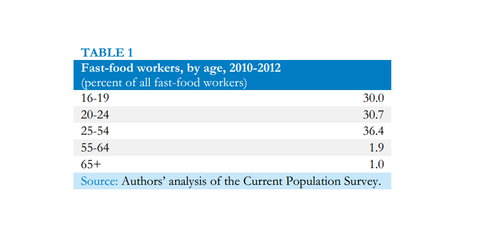Must-know: Majority of fast food workers “not” above 25 years old
Why the unionization of all fast food workers, which would increase the bargaining power of employees and possibly lead to higher wages, in quite unlikely.
Dec. 11 2013, Published 4:00 p.m. ET

But the majority of workers is not older than 25
Tracking back to the Center for Economic and Policy Research report, only about 30% of fast food workers are teenagers, another 30 are between 20 and 24, and the remaining 40% are 25 and older (see below). That sounds relatively close to the numbers presented by the government for minimum wage workers. But it would be wrong to say that the “majority” of workers are 25 and older, when they make up 40%. What does “majority” mean? The major class, the major age, or the major group? With 60% of fast food workers at age 24 and below, you can also say that’s the “majority.”
Watch out for words that may influence analysis
Other media also noted that 70% of workers are above age 20 and that heavy reliance on teenagers in the industry is a misconception. Yet I haven’t read about surveys showing that most people think the fast food industry hires “mostly teenagers.” Research also showed that a third of the adult workers held some college education, including 6.2% who held a diploma. While the infographics bolded “college education,” I would focus more on the word “some.”
It isn’t all that surprising that more young adults are working at fast food shops
There are many reasons why a college student may drop out. Given the slow recovery in employment we’ve seen over the past few years and financial problems on top of following another dream and poor performance are likely (but not complete) reasons for workers having a “some college” background. Having some college background is quite different from actually graduating. Besides, while college is still useful, a larger percent of people graduate with degrees these days, leading to increased competition. So going to college today isn’t as uncommon as it was decades ago. Many college graduates have to move back to their families as a result.
Unionization unlikely
The unionization of all fast food workers, which would increase the bargaining power of employees and possibly lead to higher wages, is quite unlikely. Although 40% of fast food workers are above 25, those who are below 24 will likely try to find better jobs. While McDonald’s does say most of its franchisees and 75% of its restaurant managers started from entry-level positions with the company (and possibly this applies more for other fast food restaurants), it ignores the fact that many people leave.
In 2011, McDonald’s tried to change the image of working at its restaurants by running ads that promoted flexible hours (meaning part-time work), medical benefits (but probably only if you work full-time), and opportunities for advancement. Merriam-Webster even added the word “McJob” to its dictionary, defined as “a low-paying job that requires little skill and provides little opportunity for advancement.” McDonald’s had said that the action by the publisher was a “slap in the face” to millions of restaurant workers.
